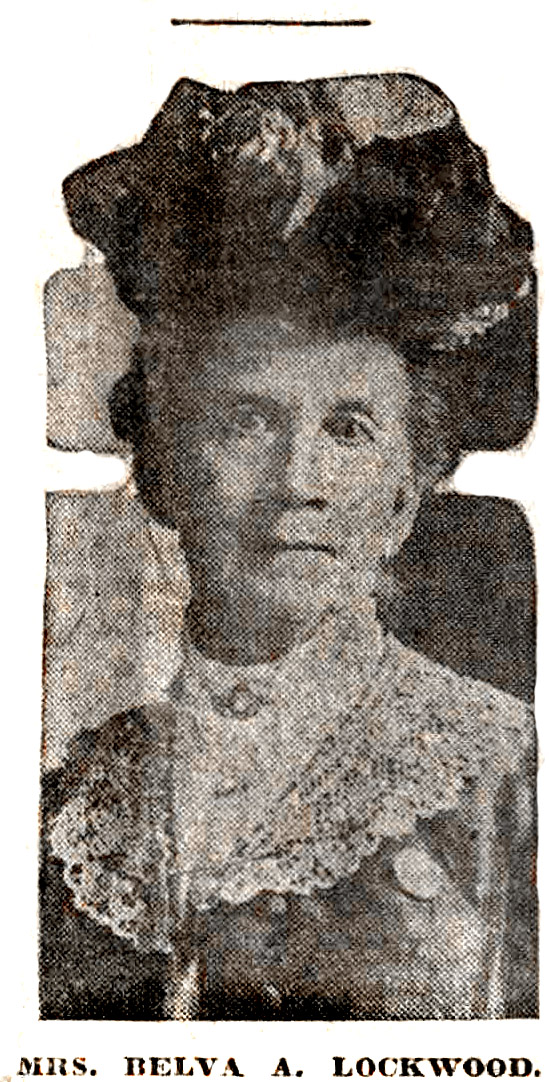Mrs. Belva Lockwood is Dead; 86 Years Old
Worker for More than Half a Century in the Cause of Woman's Rights.

Mrs. Belva Anna Lockwood, a pioneer in the woman's rights movement, worker for universal peace for more than half a century and the only woman who ever was a candidate for President of the United States, died this morning— at 10:30 o'clock at George Washington University Hospital.
Mrs. Lock wood was eighty-six years old. She had been in the hospital three weeks, suffering from a complication of diseases incident to old age. Until she was taken from her home, at 304 Indiana avenue, to the hospital, she was actively engaged in law practice. She was the first woman to ride a tricycle, and her early appearance on the machine created a sensation in Washington.
Ever since the civil war Mrs. Lockwood had been a central figure in efforts to get equal suffrage, economic and professional rights for women. She won for women the right to practice before the Supreme Court of the United States. She worked zealously for more than fifty years to open the doors of higher educational institutions to women. The home and office at 619 F street, where she lived and practiced law for nearly forty years, was a center for gatherings of leading figures in women's movements of all sorts.
Continued Law Practice.
A few years ago financial reverses compelled her to give up that residence, and she moved to the Indiana avenue residence, where she continued both her law practice and her activities in behalf of woman suffrage and peace.
No children survive Mrs. Lockwood. Funeral arrangements are being made by her grandson. D. L. Ormes, 511 3d street northwest. She also is survived by two nephews. Prof. Frank Gardner of Pennsylvania State College and Charles Wagner, who is employed by The Star. She was a member of Wesley Chapel, funeral plans will be announced tomorrow.
Mrs. Lockwood often told the anecdote of how she became one of the first women in this country to fight for equal rights. A widow at twenty-four years of age, with a child, she was teaching school in her native town, Royalton, N. Y., at a salary of only $8 a week. Man teachers, doing the same work, were getting twice as much, or more.
“I kicked to the school trustees.” she said. “I went to the wife of the Methodist minister. The answer I got opened my eyes and raised my dander. She said: ‘I can't help you: you cannot help yourself, for it is the way of the world.””
Half a Century of Battling.
The then apparent hopelessness of woman's cause so aroused her that she fought for more than fifty years against the exclusion of women from rights which men enjoyed. She fortified herself with a collegiate education at Genessee College in the days when higher education was rare among women, and for successive periods was preceptress of seminaries at Lockport, Gainsville and Oswego, N. Y.
In each place she was a leader among women's societies, and when at the close of the civil war she removed to Washington she was determined to become a lawyer and win a place before the bar. In the meantime she married again, to Rev. Ezekiel Lockwood, a Baptist clergyman in Washington, who died nine years later, in 1877. Her first husband had been Uriah H. McNall, a young farmer in Royalton.
Soon after her second marriage she began study at the National University of Law, and upon graduation, after spirited controversy, was admitted to practice before the Supreme Court of the District of Columbia.
“I never stopped fighting.” she said. “My cause was the cause of thousands of women. I drew up a bill admitting women to practice at the bar of the United States Supreme Court, and I had it passed.&rdqjuo;
This victory made her widely acclaimed. She herself was the first woman to take advantage of the new law, and at the age of forty-nine was admitted to the highest court in the land.
She won several notable legal battles, including the case of the Eastern Cherokees agt. the United States, in which she secured a settlement of $5,000,000 for the Indians.
During President Garfield's administration she made an unsuccessful application for the Brazilian mission.
Nominated for Presidency.
The most striking incident of her career then came, in 1884, with nomination by the equal rights party of the Pacific slope as a candidate for the presidency of the United States. Vain as the action was it was a unique distinction. The nomination was renewed by the same party meeting in Iowa four years later.
“When the notice of my first nomination came.” Mrs. Lockwood related, “I did not know what to do with it. so I stuck in in my pocket, and kept it a secret for several days, until t was asked to support Ben Butler for the presidency. ‘ I can't do it,” I answered, ‘I have a nomination myself.’” The politician appeared skeptical, so she produced the document, under pledge of secrecy, but before night it was in the newspapers.
In 1889 she was a delegate of the Universal Peace Union to the International Peace Congress in Paris, and again in 1890 to the congress at London, where she presented papers on arbitration and disarmament. She lectured throughout the country, and until her last days maintained her law office in Washing ton.
She was born October 24. 1830. Her maiden name was Belva Anna Bennett.
